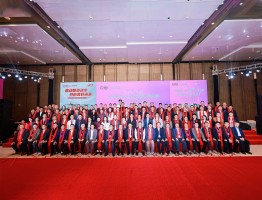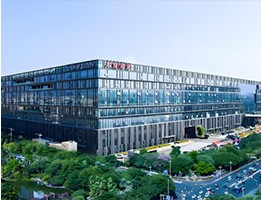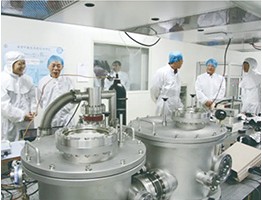CST Global leads $1m project to develop high-speed DFB lasers
source:optics.org
release:Nick
keywords: next-gen comms; CST Global
Time:2017-08-10
Innovate UK-funded DiLaN partnership is using nano-imprint lithography to develop sources for next-gen comms.

CST Global's new 4 inch wafer bar stacker machine.
CST Global, a subsidiary of Sivers IMA Holdings, and a III-V opto-electronic semiconductor foundry is leading the UK Government-funded Diode Laser manufacturing process using Nano-imprint lithography ("DiLaN") project.
The DiLaN project is aiming to produce high-speed DFB lasers with significantly larger broadband line rates than are currently available, whilst using a new manufacturing process aimed at cutting laser costs by a third.
Andrew McKee, Director of Engineering at CST Global commented, “The massive growth in broadband communications for the fiber to the premises market has two driving factors.
The first is a rapid increase in demand for single-mode, semiconductor laser solutions, which currently exceeds 100 million new units per year. The second is that the data rate capability of lasers using current passive optical networking technology, at around 1.25-2.5 Gbit/s, is not enough to satisfy the ever-increasing bandwidth demands of next-generation networks.
“Nano-imprint lithography is widely recognized as the most credible method of producing high throughput, high-resolution, single-mode semiconductor lasers at low cost. These lasers also operate in the 1310–1550nm wavelength spectrum, which supports the increased line rates necessary for next generation networks.”
Andrew McKee.
Partnership
The DiLaN project – described in more detail on the UK Research Councils’ website – is seeking to implement a commercially viable, nano-imprint lithography production process for high volume DFB semiconductor lasers.
Such as source would enable the delivery of increased data rates of 25Gbps and the required cost saving, estimated at up to 30% per laser. CST Global is the project leader, with support from academic partners Cardiff University and the University College of Swansea & West Wales with commercial partner, Compound Semiconductor Centre, also in Cardiff.
The DiLaN project grant is valued at £821,000, with CST Global receiving £268,000. The funding organization is Innovate UK, a UK government, research funding agency for engineering and the physical sciences. The project runs from February 2017 to January 2019.

CST Global's new 4 inch wafer bar stacker machine.
CST Global, a subsidiary of Sivers IMA Holdings, and a III-V opto-electronic semiconductor foundry is leading the UK Government-funded Diode Laser manufacturing process using Nano-imprint lithography ("DiLaN") project.
The DiLaN project is aiming to produce high-speed DFB lasers with significantly larger broadband line rates than are currently available, whilst using a new manufacturing process aimed at cutting laser costs by a third.
Andrew McKee, Director of Engineering at CST Global commented, “The massive growth in broadband communications for the fiber to the premises market has two driving factors.
The first is a rapid increase in demand for single-mode, semiconductor laser solutions, which currently exceeds 100 million new units per year. The second is that the data rate capability of lasers using current passive optical networking technology, at around 1.25-2.5 Gbit/s, is not enough to satisfy the ever-increasing bandwidth demands of next-generation networks.
“Nano-imprint lithography is widely recognized as the most credible method of producing high throughput, high-resolution, single-mode semiconductor lasers at low cost. These lasers also operate in the 1310–1550nm wavelength spectrum, which supports the increased line rates necessary for next generation networks.”

Andrew McKee.
Partnership
The DiLaN project – described in more detail on the UK Research Councils’ website – is seeking to implement a commercially viable, nano-imprint lithography production process for high volume DFB semiconductor lasers.
Such as source would enable the delivery of increased data rates of 25Gbps and the required cost saving, estimated at up to 30% per laser. CST Global is the project leader, with support from academic partners Cardiff University and the University College of Swansea & West Wales with commercial partner, Compound Semiconductor Centre, also in Cardiff.
The DiLaN project grant is valued at £821,000, with CST Global receiving £268,000. The funding organization is Innovate UK, a UK government, research funding agency for engineering and the physical sciences. The project runs from February 2017 to January 2019.
NEWS
 Four-Meeting Linkage: China Laser CEO Shenzhen Night Shines Bright
Four-Meeting Linkage: China Laser CEO Shenzhen Night Shines Bright Lead the Intelligent Welding Revolution: Greater Bay Area AI + Laser Welding Summit
Lead the Intelligent Welding Revolution: Greater Bay Area AI + Laser Welding Summit Splashing 200 Million Yuan! Three Industry Giants Boost Investment in the Laser Track
Splashing 200 Million Yuan! Three Industry Giants Boost Investment in the Laser Track Two New Companies Established! Han's Ecosystem Further Expands
Two New Companies Established! Han's Ecosystem Further Expands Multi-Sector Flourish! Five Major Laser Parks Rise Rapidly
Multi-Sector Flourish! Five Major Laser Parks Rise Rapidly
INTERVIEW
 Intelligent Scientific Systems: Leading Domestic Ultrafast Imaging, Redefining Visual Perception
Intelligent Scientific Systems: Leading Domestic Ultrafast Imaging, Redefining Visual Perception From Rural Girl to Laser Helmsman: Fu Chunhua's Light-Chasing Journey
From Rural Girl to Laser Helmsman: Fu Chunhua's Light-Chasing Journey Scanner Optics: Galvanometer Tech Leader
Scanner Optics: Galvanometer Tech Leader The "Light Chasers" in the Deep Ultraviolet World
The "Light Chasers" in the Deep Ultraviolet World Shi Lei (Hipa Tech): Focus on Domestic Substitution, Future Layout in High-End Laser Micromachining
more>>
Shi Lei (Hipa Tech): Focus on Domestic Substitution, Future Layout in High-End Laser Micromachining
more>>
